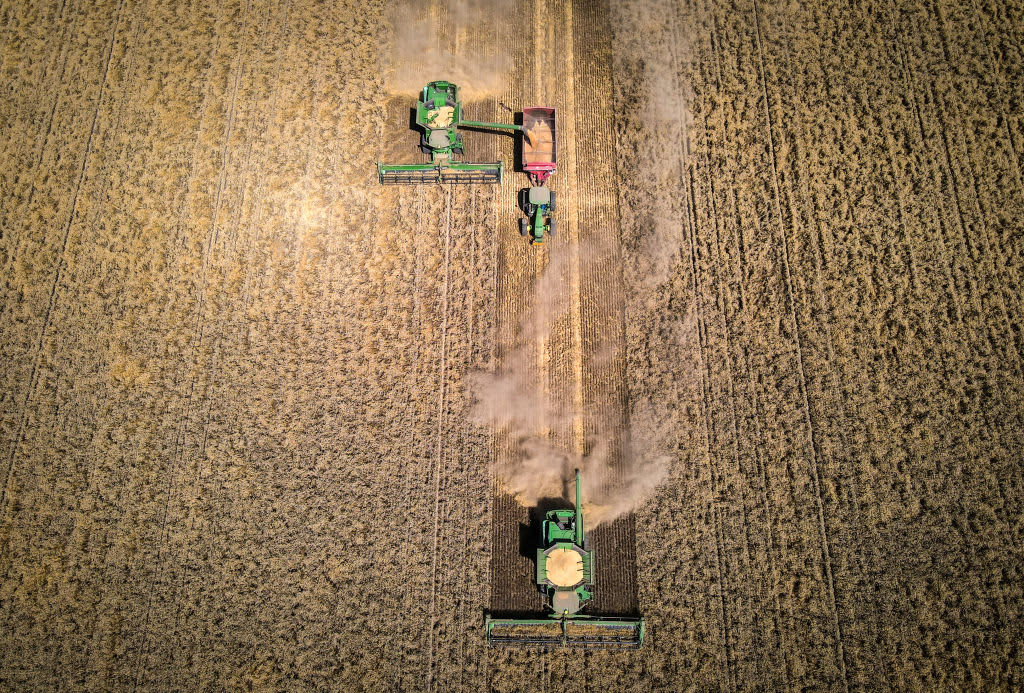
Australia’s farmers are not opposed to net zero carbon emissions, but they want don’t want climate change policies to burden them, Agriculture Minister David Littleproud said Wednesday.
“I think what they want to do is be part of the global community,” the minister said on CNBC’s “Squawk Box Asia.”
“They want to make sure that anything, any policy setting that the government implements, is one that actually doesn’t cost too much, and doesn’t put the burden back on them,” he added.
The agriculture sector was responsible for 15% of Australia’s greenhouse gas emissions — around 76.5 million tonnes — in 2019, according to policy think-tank Grattan Institute.
The transportation sector accounts for about 20% of Australia’s emissions, while the industrial sector is responsible for around 30% of its emissions.
A farmer operates a combine harvester as he unloads wheat into a grain cart during a harvest at a farm near Gunnedah, New South Wales, Australia, on Tuesday, Nov. 10, 2020.
David Gray | Bloomberg via Getty Images
Still, agriculture needs to be included in any net zero targets for Australia as it would reduce the risk of exporters being hit with future carbon tariffs from other countries, the report said.
The National Farmers’ Federation, which represents farmers and broadly Australia’s agriculture sector, already backs a nationwide of having net zero emissions by 2050.
However, they have stipulated that two things must happen: an economic pathway must be identified, and farmers should not be burdened by unnecessary red tape.
“The NFF has been crystal clear and steadfast in our discussions with the Government: climate change policy must chart a course for agriculture and the bush to not only survive but thrive in a reduced emissions future,” the president of the federation, Fiona Simson, has said.
Net zero target
Australia is one of the few developed nations that has not yet set a target for net zero greenhouse gas emissions by a certain date — fossil fuels still play a dominant role in its economy.
Net zero emissions refer to achieving an overall balance between greenhouse gas emissions produced and greenhouse gas emissions taken out of the atmosphere.
The government has focused on deploying technology to help reduce emissions instead of penalizing polluters using direct or indirect carbon taxes.
Climate change has had devastating consequences for Australia.
Between 2019 and 2020, the country suffered unusually intense bushfires due to prolonged droughts and scorching temperatures that destroyed thousands of homes and killed hundreds through smoke inhalation.
Australia’s scientific research body CSIRO predicts that the country will experience frequently hotter days, rising sea levels, less snowfall and extreme and intense rainfall in the coming years due to climate change.
Ahead of the COP26 climate change conference, Prime Minister Scott Morrison is pushing for the federal government to make a binding pledge to achieve net zero emissions by 2050.
World leaders and environmentalists will be meeting in Glasgow, Scotland — from Oct. 31 to Nov. 12 — in a bid to hash out a climate change deal.
Morrison said that the climate target would be decided by the federal cabinet, without legislation in Parliament, implying that lawmakers who oppose the move would not be able to stop the government from making that commitment, the Sydney Morning Herald reported.
Littleproud’s National Party, which is a member of the ruling coalition led by Morrison’s Liberal Party, is expected to outline its position on the net zero target by the end of the week.
“We’re being pragmatic. And we intend to be able to resolve this and be able to give the National party’s position by the end of the week,” Littleproud told CNBC.
The Sydney Morning Herald reported that the Nationals want more spending on regional Australia, a long-term plan for jobs and the willingness to explore nuclear energy.
A recent report from the think-tank Australia Institute said around 75% of Australians surveyed are concerned about climate change. Meanwhile, seven in 10 respondents said they think the country should set targets and implement domestic action to limit global warming and achieve net zero emissions.




